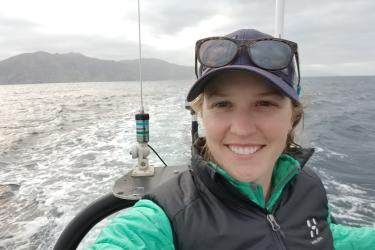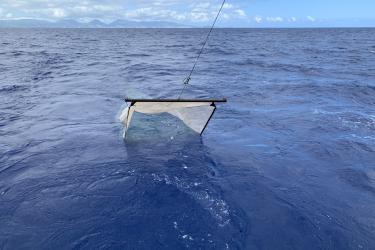Bottomfishing has a unique tradition in Hawai'i that dates back to ancient times. Ancient Hawaiians targeted bottomfish such as ‘ōpakapaka (Hawaiian pink snapper, Pristipomoides filamentosus) using fishing canoes launched from shore. They located fishing spots by triangulating landmarks and used customary knowledge to read winds, waves, and currents. Line was made using woven plant fibers or hair. Stones were used to drop baited shell or bone hooks to depths of 350 meters to catch fish.
Today, fishermen use advanced technology to target bottomfish, such as custom fiberglass boats outfitted with gas efficient 4-stroke engines and sophisticated location and sonar equipment such as GPS, depth, and fish finders. Although technology has made locating fish and fishing spots easier, bottomfishing still requires a tremendous amount of knowledge and skill. Bottomfishers must be able to read ocean currents, skillfully maneuver their boat, and have a sophisticated understanding of ocean bathymetry. It may take a decade or more of sustained effort—maybe a lifetime—to become a good bottomfisher.

Onaga catch off to market, Maalaea Harbor, Maui in September 1980 (Photo courtesy of Salvador Santo).
The Hawai‘i bottomfishing community, the Western Pacific Regional Fisheries Management Council, and stock assessment scientists at the Pacific Islands Fisheries Science Center (PIFSC) are interested in documenting the culture, traditions, and fishing techniques unique to Hawai‘i bottomfishing community in order to ensure sustainable management for future generations. Thus, the Socioeconomics Program at PIFSC are partnering with the Pacific Islands Fisheries Group to conduct an oral history of bottomfishing in Hawai‘i.
Oral history differs from other types of social research by placing the focus on collecting personal experiences and reflections of past events through stories. Interviewees or ‘narrators’ are encouraged to tell stories in their own way. PIFG is interviewing bottomfishermen on the islands of Maui, Hawai‘i, Kaua‘i, O‘ahu, Moloka‘i, and Lāna‘i in order to:
- develop a bottomfishing “family tree” to visualize knowledge transfer over time;
- document traditional knowledge and changes in fishing techniques, including rotation of fishing spots and introduction of new technologies;
- understand adaptations to weather, climate and regulatory regimes;
- detail individual-level gear innovation; and
- record culture, practices, and traditions specific to bottomfishing, including social and cultural sharing of catch and preferred meal preparation for various bottomfish species.
Stay tuned for updates from the field throughout 2017.

Sampan arriving at Maalaea Harbor, Maui in 1980 (Photo courtesy of Salvador Santos).
For more information about this research feel free to contact us: pifsc.socioeconomics@noaa.gov
This project is supported by NOAA Preserve America Initiative and a NOAA Fisheries Pacific Islands Region Cooperative Research grant.




